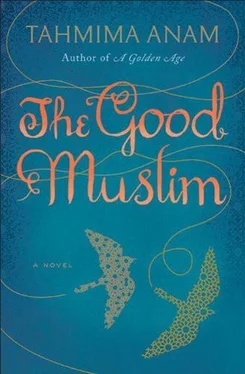‘These islands come up every year, after the monsoon. They might stay, they might get eaten by the river in a few months. That one over there’ — he pointed to what looked like the shore — ‘is old, it’s been around for years. Your madrasa must be built on one of the older islands.’ He said something to the boatman. ‘Let’s stop here and ask.’
‘Too late,’ the boatman said. ‘We’ll stop now and try tomorrow.’
Maya checked her watch. Seven o’clock, but it was fully dark already, the river grey and black and suddenly quiet.
The boatman boiled rice on a makeshift stove beside the engine, and Khoka fried a few shrimps he had caught over the side of the boat. They ate in silence, Maya surprised by the delicious, salty crunch of the shrimp. After the meal, Khoka said, ‘The boatman wants to ask you a question, Dakhtar.’ He guided the old man towards her. Deep folds sectioned his face and made it kind. ‘My wife,’ the boatman said, ‘it’s her throat.’ He moved his hands up and down his own sagging neck. ‘It’s round, like this.’
‘You mean it’s swollen?’
‘Looks like she swallowed a pumpkin.’ His own lips were rimmed with orange from betel nut, his mouth black.
‘It’s called a goitre,’ Maya said. ‘She needs iodine. When you go to the shop to buy salt, tell them you want salt with iodine.’
‘Will it cost?’
‘Same as the other salt.’ It was the law now that all salt must contain iodine, but not every producer complied. In Rajshahi she had persuaded the salt-sellers to convert to iodine salt. There were no swollen throats in her village.
The boatman raised his right hand to his forehead, thanking her. Then he signalled for her to stretch out along the boat; he and Khoka would find a dry spot on the shore. She fell asleep quickly, hugging her arms tightly over herself and using the burkha as a blanket.
In the morning Khoka hailed a group of men heading towards the fields. Yes, they were told, there’s a madrasa here. They trudged between a few patches of paddy and came upon a blue school building made entirely of wavy sheets of tin. A handful of children loitered on a rough patch of grass outside the building. ‘This can’t be it,’ Maya said, turning away.
‘You don’t want to find the headmaster?’
‘Look,’ she said, pointing to the children. ‘Girls.’
They continued upriver, the boatman straining against the current. They stopped a few more times, turning up at makeshift schoolhouses and outbuildings on the grounds of mosques. The islands had an air of impermanence about them, the people appearing light and carefree as their saris and lungis ballooned out with the force of the river wind. Perhaps, Maya thought, as the sun dipped once more under its watery horizon, I will return here someday with a happier heart.
The next morning they stopped at a large island that rose several feet from the river. Maya and Khoka followed the path that began at the water’s edge, their toes sinking into the silt. After a few steps the ground grew higher and became dry, and then the going was comfortable, Khoka swinging her bag as he walked, the koel and the bulbul singing in chorus, singing them on.
Two more false starts and they were standing in front of a small blue door worked into a solid, windowless wall. Maya felt a hollow throb at the pit of her stomach. ‘This must be it.’ She pulled the burkha out of her bag and slipped it over her head. She tied the nikab over her head and face, surprised by the feeling of her own breath against her cheeks. ‘Wait by the boat,’ she told Khoka. ‘We may have to leave in a hurry.’
She circled the building like a thief. There was a high wall going all the way around the compound, and several smaller buildings around a central courtyard. A deep smell, of unwashed boys and rotting bananas, coated the building like a mist. Finally she gathered up the courage and knocked. A boy, older than Zaid, opened the door immediately. ‘Where is the Huzoor?’ she said. ‘Take me to him.’
He hesitated. ‘Big Huzoor or Small Huzoor?’
She didn’t know. ‘Doesn’t matter. Big, I suppose. Whoever’s in charge.’
The boy straightened, as if remembering something. ‘Women are not allowed,’ he said.
‘It’s all right, he’s expecting me.’ She reached out and patted the boy’s cap, but he stiffened, stepping back into the darkness.
‘No,’ he said, and made to close the door.
She grabbed his shoulders. ‘The Huzoor will see me,’ she said. ‘Take me inside.’
He pushed her and slammed the door. She banged with her fist, knowing he was waiting on the other side. ‘Open up!’
She circled the building again, looking for an entrance. It appeared deserted, no footsteps, no sounds of any kind. She went back to the door. Banged again. The inside of the nikab was black and searing. The breath roared out of her.
Nothing. She turned around, ran back to the river. The boat was unmoored, Khoka and the boatman waiting with the oars on their laps. ‘They won’t let me inside,’ she said.
‘How many?’ Khoka asked.
‘Just a boy. The classrooms must be at the back, but I couldn’t tell.’
‘Let me come with you,’ Khoka said. ‘I can try and find a way in.’ He waded to shore.
They tried the door again. The boy opened, and Khoka spoke. ‘We need to come inside,’ he said; ‘it’s very important.’
The boy pointed to Maya. ‘No women allowed.’
Khoka pushed the boy aside and stepped through the gap in the door. Maya was about to follow, but Khoka closed the door behind him. She heard a scuffle inside, footsteps, muffled, tense voices. Right now , she heard. Right now .
The door opened. Khoka was holding the boy by the elbow. ‘Come in,’ he said. ‘I’ll stay here.’
‘What did you tell him?’ she whispered.
‘That you are the sister of Huzoor Haque and you have come on important business, and that, inshallah, if you are allowed inside, great blessings will fall upon the madrasa.’
‘Really?’
‘Actually forgive me, Dakhtar, I told the boy I would beat him till the blood ran out of his ears if he didn’t do as I said.’
The boy sniffed angrily, turned around and led her through a corridor and out into the open courtyard. He asked her to wait while he spoke to the Huzoor. ‘Tell him I’m Mrs Haque,’ she said. She waited, trying not to fidget in the heat. The boy emerged and led her into a small chamber. A very thin man with a neatly trimmed beard sat behind a desk with a pen in his hand. Glasses high on the bridge of his nose.
‘I’d like to speak with the Huzoor,’ she said. ‘Which one are you?’
‘I’m Choto Huzoor.’
‘Where’s the Big Huzoor?’
‘Travelling.’
Maya appraised the man. Rokeya’s sister was right about the burkha: from inside, she could stare freely without being noticed. She saw the man’s tapered, unworked fingers, the dark pools of his eyes, with their trace of surma. His jellaba was long, sweeping his ankles. She swallowed a fist of fear, remembering the man who had put the knife to her throat.
He set down his pen. ‘How can I be of service to you, sister?’ He smiled with narrow teeth.
Maya approached, put her hands on the table. ‘I want someone. A boy.’
The Huzoor looked down at his shoes, and suddenly she wasn’t afraid of him; he knew why she was there, knew it from the way she stood and pointed her face at him now, and his fingers trembled and the pen shook, like the line of an irregular heartbeat. She said, ‘I won’t stay long. I’ve come to collect Zaid Haque. You will give him to me and I will not trouble you further.’
She prepared herself for an argument, but he sat frozen at his desk, the pen hovering in mid-air. She noticed his fingernails were dyed red with henna. She repeated herself, raised her voice. She heard herself threatening him, telling him she would tell the Big Huzoor and he would inform his superiors. He would be disgraced. Then she would call the police and have the madrasa closed down. He would be arrested. Have you ever seen the inside of a prison, Huzoor? He stood up now and blocked the door, and she stepped up to him, placed her hands on his chest. ‘I know what you’ve done,’ she said. ‘I know and God knows and you’ll burn in dosok for it.’ There was a tremor in his voice as pointed to the back of the compound, mumbling something about a shack, a locked door. ‘I know what you’ve done,’ she said again, as he pulled a key from around his neck. ‘I know and God knows.’
Читать дальше












